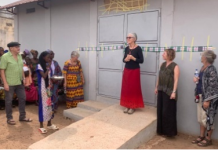By Awa B. Bah
The Gambia Bureau of Statistics GBoS, with support from the government of the Gambia and development partners, on Friday 12 May 2017 launched the Preliminary Findings of the 2015/2016 Integrated Household Survey, at a local hotel, in the Senegambia area.
GBoS, the coordinating agency for national statistical system in The Gambia, is finalizing the National Strategy for the Development of Statistics (NSDS) for the period 2017-2021. The preparatory work brought together key stakeholders including government institutions, the World Bank and UN agencies in The Gambia. The planning process took a lot of time, but this was necessary as this is the first time that such a comprehensive survey that provides estimates at district level, is conducted.
The survey covered over 13,000 households spread over a 12-month data collection period. The strategy intends to provide timely indicators to monitor the national development plan implementation, as well as the SDGs and AU Agenda 2063.
This survey also provides the basis for the conduct of future surveys in terms of content and coverage while the questionnaires were opened to updates and adjustments, they were designed in a very comprehensive manner so that other surveys could be built from them, as they deal with a wide range of topics covering valuable topics, monitoring poverty, other social indicators and arising issues. GBoS has had constant technical support from World Bank throughout the design, implementation and analysis.
In delivering the opening address, the Statistician General at Gambia Bureau of Statisticians, Nyakassi M.B. Sanyang , indicated that the survey commenced with preparatory activities in late 2014 and continued in the first quarter of 2015.
Integrated Household Surveys (IHS) he highlighted is not only the source of specific types of data required for effective policymaking but also offer the most reliable information for targeted interventions.
The HIS he said is one of the most important sources of statistical data on household expenditure and income as well as for other data on housing status, individual and household characteristics, and living conditions.
He said the 2015/16 IHS integrated all the lessons learnt from the previous IHS surveys and built a foundation for the future surveys. The survey he said aimed to provide indicators that are representative at district-level, including district poverty profile so as to inform decision-making about decentralization policy, social protection and other decentralized programs, adding that this is value added compared to previous IHS approach and makes it the benchmark for future Integrated Household Surveys for better comparison of indicators.
He however urged the government, development partners, NGO, CSOs and other data users to use this data to guide decision making, planning and policy formulation at all levels of society In particular, the results from this survey will contribute in finalizing the national development plan, the rebasing of the consumer price index (CPI) and household final consumption data for the rebasing of the gross domestic product (GDP).
Furthermore, he revealed intensions to take advantage of the advancements in the use of technology in data collection, processing and analysis which will help hugely in the production of real time data.
He Commended the Ministry of Finance and Economic Affairs for the support in the coordination and financing of the study by the United Nations Development Programme (UNDP) for its continued assistance and the UN Resident Coordinator in particular, for mobilizing the UN agencies to support this study such as the United Nations Children’s Fund, Food and Agricultural Organization, World Food Programme, World Health Organization and the United Nations Population Fund for both the technical and financial support provided during the study.
For her part, Louise J. Cord the World Bank Country Director in the Gambia on behalf of the World Bank congratulated the Bureau for coming up with a very comprehensive report, adding that the metrology and quality used in putting up this report reflects on international practice.
The survey she noted took time but the outcomes matter as these results are the compass for the government of the Gambia as well direct future programs to benefit those who need it most. She add that the data serves as tools to get a target for those programs as it will be the basis of a national development plan because the World Bank she admits will use it to develop the country engagement note that is going to guide their engagement over the next two years in the Gambia and used it to direct a systematic country diagnostic which she reveals is a broad analysis of what are the constrains in achieving world bank objectives which is eliminating extreme poverty by 2030 and promoting early income growth
She underscored the need for using this data by stakeholders such as students, academics, educationist which is a huge step forward.
Deputizing the Honorable Minister of Finance and Economic Affairs was the Permanent Secretary Lamin Sanneh who said the findings of the 2015/2016 integrated Household Survey cannot come at a better time as it will guide the government and its development partners in formulating strategies to address development challenges in line expectations.
He noted that this is also the first major household survey that is finalized after the approval of the Sustainable Development Goals (SDG) indicators as well as the AU Agenda 063. which are both international frameworks to which The Gambia has subscribed and therefore the results from this survey will help the Government of The Gambia to finalize the national development plan based on actual facts.
“This report provides an insight into the extent and nature of poverty and inequality in terms of income, education, and health services and other key poverty related measurements”, adding that It is well noted that data disaggregated by locality and socio-economic characteristics such as educational attainment, employment status, occupation, skills, access to health and sanitary facilities arc invaluable information for targeting the most vulnerable socio economic groups in any society, adding that also this report will to a large extent, address the increasing demand for data on gender and specific population groups and age cohorts (e.g. women, children and youth).
The added advantage of the third Integrated Household Survey Sanneh revealed is the availability of estimates for indicators at a micro level, the district level, than the previous HIS.
In her statement by UN Resident Coordinator and UNDP Resident Representative in the Gambia Ade Mamnoyane Lekoetje said this exercise and earlier ones in 1992, 1998 and 2010 have supported the strengthening of national capacities for economic management, and evidence based planning and budgeting as it is within this context that support to national statistic and statistical development strategy are considered important in planning and programming with implementing partners.
After five years, She revealed the current findings could not have come at better time than now when the country is finalizing its medium-term national development plan, the findings of which will not only be important for the new government to set targets but will provide solid baseline information to measure future progress as well for the performance in the implementation of MDGs, and will form useful baseline for the SDGs of the new administration of The Gambia.
“Globally, nearly 1/2 of the world’s population more than 3 billion people- live on less than $2 SO a day, More than 1 .3 billion have lived in extreme poverty less three million people live on $1.25 a day. Today, fewer people live in extreme poverty than ever before. Even as the world’s population has grown, the number of the poor has gradually fallen. In 1990, people were living under the International extreme poverty of $1.90 a day”, said the by UN Resident Coordinator and UNDP Resident Representative.
She pointed out that the world is faced with big challenges to help the world’s poorest people and ensure that everyone sees benefits from economic growth, she added data and research help us understand these challenges and set priorities, share knowledge of what works, and measure progress. Statistics is indispensable if we are to plan, act and measure human development in all aspects.
She re affirmed the need to pursue human development for everyone such as caring for those left our which requires reaching those left our using universal policies, inclusive growth, pursuing measures for groups with special needs for persons with disabilities, making human development resilient and empowering those left out.
She further noted that subsequent presentation of the survey findings provide useful data for the new Barrow Government administration which when used will lead to more people centered development processes for greater impact in our journey to the attainment of the SDG one by 2030.
He strongly hope that the finding of the IHS will contribute immensely to the core agenda of the new government and will enhance planning, programming, budgeting, targeting of public interventions for a more inclusive and participatory development of the country thereby contributing to economic growth, poverty eradication and prosperity of everybody.
She assured UNDP’s commitment and willingness to continue supporting national statistical system and strategies in the country and pointing out that they will continue to work with other partners in this great and noble task.
The event was highlighted with presentation of the demographic and socio economic indicators followed by discussion.




















